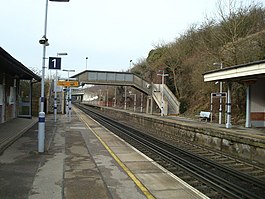Knockholt railway station is on the South Eastern Main Line, located in the London Borough of Bromley, Greater London. It is 16 miles 44 chains (26.6 km) down the line from London Charing Cross and is situated between Chelsfield and Dunton Green stations. It is in Travelcard Zone 6 and is located next to the Greater London boundary with the Kent district of Sevenoaks. The boundary is the farm bridge at the southern end of the platforms.
| Knockholt | |
|---|---|
 | |
| Location | Chelsfield |
| Local authority | London Borough of Bromley |
| Managed by | Southeastern |
| Station code(s) | KCK |
| DfT category | E |
| Number of platforms | 2 |
| Fare zone | 6 |
| National Rail annual entry and exit | |
| 2018–19 | |
| 2019–20 | |
| 2020–21 | |
| 2021–22 | |
| 2022–23 | |
| Railway companies | |
| Original company | South Eastern Railway |
| Pre-grouping | South Eastern and Chatham Railway |
| Post-grouping | Southern Railway |
| Key dates | |
| 1 May 1876 | Opened as Halstead for Knockholt |
| 1 October 1900 | renamed Knockholt |
| Other information | |
| External links | |
| Coordinates | 51°20′45″N 0°07′51″E / 51.3459°N 0.1307°E |
Location
editThe station is 4.8 km (3.0 mi) north-northeast of the village of Knockholt but closer to several other settlements. The station serves several small communities in the Sevenoaks district in addition to Knockholt; Badgers Mount 1.3 km (0.81 mi) to the southeast, Well Hill 1.3 km (0.81 mi) northeast, and Halstead 2.2 km (1.4 mi) south. Within the Bromley borough Pratt's Bottom is only 2 km (1.2 mi) west-southwest; and also Chelsfield (although having its own railway station, is in parts closer to Knockholt station) at about 2.7 km (1.7 mi) to the north and west. To avoid confusion with Halstead in Essex it was named after the next closest village.
Services
editAll services at Knockholt are operated by Southeastern using Class 376, 465, 466 and 707 EMUs.
The typical off-peak service in trains per hour is:[2]
- 2 tph to London Charing Cross via Grove Park and Lewisham
- 2 tph to Sevenoaks
Connections onto fast services to London, Tunbridge Wells and Hastings can be made by changing at Orpington or Sevenoaks.
| Preceding station | National Rail | Following station | ||
|---|---|---|---|---|
| Southeastern | ||||
History
editWhen the South Eastern Railway (SER) opened their "cut off" line through Orpington, Sevenoaks to Tonbridge in 1868, there was no station between Chelsfield and Dunton Green. A Knockholt Vestry meeting in March 1871 resolved to request the SER to build a station for Knockholt but this request was initially refused. Eventually, the SER agreed to provide a station if a £3,000 contribution was provided by "local parties," (equivalent to £360,000 in 2023).[3] This was raised and "Halstead for Knockholt" (the station being much closer to Halstead than Knockholt) was opened in 1876.[4]
Between 1887 and 1915 a twice daily bus service operated from Knockholt village to the station.
In 1899 the SER joined with its arch rival to form the South Eastern and Chatham Railway (SECR). Alfred Smithers, who had moved to Knockholt in 1881, became deputy chairman of the SECR. At the strong suggestion of Smithers, the station name was changed to "Knockholt" in 1900 to avoid the confusion which had arisen with Halstead Station in Essex (and coincidentally giving Smithers a local station named after his village).
References
edit- ^ a b c d e "Estimates of station usage". Rail statistics. Office of Rail Regulation. Please note: Some methodology may vary year on year.
- ^ Table 204 National Rail timetable, December 2022
- ^ UK Retail Price Index inflation figures are based on data from Clark, Gregory (2017). "The Annual RPI and Average Earnings for Britain, 1209 to Present (New Series)". MeasuringWorth. Retrieved 7 May 2024.
- ^ A History of Knockholt, pp. 128–130, by David Waldron Smithers, ISBN 0-9513500-4-8.
External links
edit- Train times and station information for Knockholt railway station from National Rail
